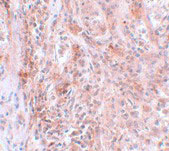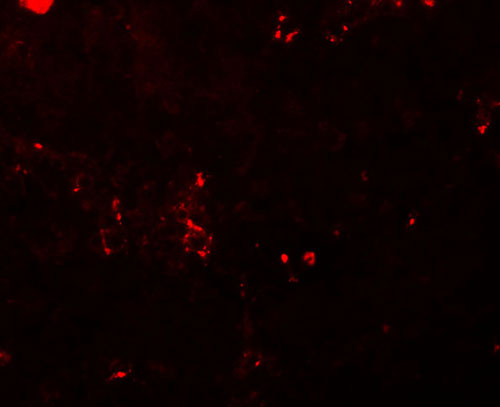BCAS2 Antibody
- 产品详情
- 实验流程
- 背景知识
Application
| WB, IF, E, IHC-P |
|---|---|
| Primary Accession | O75934 |
| Other Accession | CAG46834, 49457027 |
| Reactivity | Human, Mouse, Rat |
| Host | Rabbit |
| Clonality | Polyclonal |
| Isotype | IgG |
| Calculated MW | 26131 Da |
| Concentration (mg/ml) | 1 mg/mL |
| Conjugate | Unconjugated |
| Application Notes | BCAS2 antibody can be used for detection of BCAS2 by Western blot at 0.5 - 1 µg/mL. Antibody can also be used for immunohistochemistry starting at 5 µg/mL. For immunofluorescence start at 20 µg/mL. |
| Gene ID | 10286 |
|---|---|
| Other Names | Pre-mRNA-splicing factor SPF27, Breast carcinoma-amplified sequence 2, DNA amplified in mammary carcinoma 1 protein, Spliceosome-associated protein SPF 27, BCAS2, DAM1 |
| Target/Specificity | BCAS2; |
| Reconstitution & Storage | BCAS2 antibody can be stored at 4℃ for three months and -20℃, stable for up to one year. As with all antibodies care should be taken to avoid repeated freeze thaw cycles. Antibodies should not be exposed to prolonged high temperatures. |
| Precautions | BCAS2 Antibody is for research use only and not for use in diagnostic or therapeutic procedures. |
| Name | BCAS2 |
|---|---|
| Synonyms | DAM1 {ECO:0000303|PubMed:10403562} |
| Function | Required for pre-mRNA splicing as component of the activated spliceosome (PubMed:28076346, PubMed:28502770, PubMed:29301961, PubMed:29360106, PubMed:30705154). Component of the PRP19-CDC5L complex that forms an integral part of the spliceosome and is required for activating pre-mRNA splicing. May have a scaffolding role in the spliceosome assembly as it contacts all other components of the core complex. The PRP19-CDC5L complex may also play a role in the response to DNA damage (DDR). |
| Cellular Location | Nucleus. Nucleus, nucleolus |
| Tissue Location | Ubiquitously expressed. |
For Research Use Only. Not For Use In Diagnostic Procedures.
Provided below are standard protocols that you may find useful for product applications.
BACKGROUND
BCAS2 Antibody: BCAS2 was identified through differential display analysis as an mRNA species that was overexpressed in MCF7 and BT-20 breast cancer cell lines. The chromosomal region containing this gene, 1p13.3021, is amplified in these cells lines. BCAS2 is a transcriptional cofactor that enhances estrogen receptor-mediated gene expression, and directly interacts with the tumor suppressor p53 to reduce p53 transcriptional activity by reducing p53 protein level in the absence of DNA damage. Deprivation of BCAS2 through RNA inhibition induces apoptosis in p53-wild type cells, but causes G2-M arrest in p53-null or -mutant cells; this effect was reversed with the expression of ectopic BCAS2. BCAS2 may thus be potentially useful as a therapeutic target in the treatment of cancer.
REFERENCES
Nagasaki K, Maass N, Manabe T, et al. Identification of a novel gene, DAM1, amplified at chromosome 1p13.3-21 region in human breast cancer cell lines. Cancer Lett.1999; 140:219-26.
Qi C, Zhu YT, Chang J, et al. Potentiation of estrogen receptor transcriptional activity by breast cancer amplified sequence Biochem. Biophys. Res. Commun.2005; 328:393-8.
Huo PC, Tsao YP, Chang HW, et al. Breast cancer amplified sequence 2, a novel negative regulator of the p53 tumor suppressor. Cancer Res.2009; 69:8877-85.
终于等到您。ABCEPTA(百远生物)抗体产品。
点击下方“我要评价 ”按钮提交您的反馈信息,您的反馈和评价是我们最宝贵的财富之一,
我们将在1-3个工作日内处理您的反馈信息。
如有疑问,联系:0512-88856768 tech-china@abcepta.com.























 癌症的基本特征包括细胞增殖、血管生成、迁移、凋亡逃避机制和细胞永生等。找到癌症发生过程中这些通路的关键标记物和对应的抗体用于检测至关重要。
癌症的基本特征包括细胞增殖、血管生成、迁移、凋亡逃避机制和细胞永生等。找到癌症发生过程中这些通路的关键标记物和对应的抗体用于检测至关重要。 为您推荐一个泛素化位点预测神器——泛素化分析工具,可以为您的蛋白的泛素化位点作出预测和评分。
为您推荐一个泛素化位点预测神器——泛素化分析工具,可以为您的蛋白的泛素化位点作出预测和评分。 细胞自噬受体图形绘图工具为你的蛋白的细胞受体结合位点作出预测和评分,识别结合到自噬通路中的蛋白是非常重要的,便于让我们理解自噬在正常生理、病理过程中的作用,如发育、细胞分化、神经退化性疾病、压力条件下、感染和癌症。
细胞自噬受体图形绘图工具为你的蛋白的细胞受体结合位点作出预测和评分,识别结合到自噬通路中的蛋白是非常重要的,便于让我们理解自噬在正常生理、病理过程中的作用,如发育、细胞分化、神经退化性疾病、压力条件下、感染和癌症。








